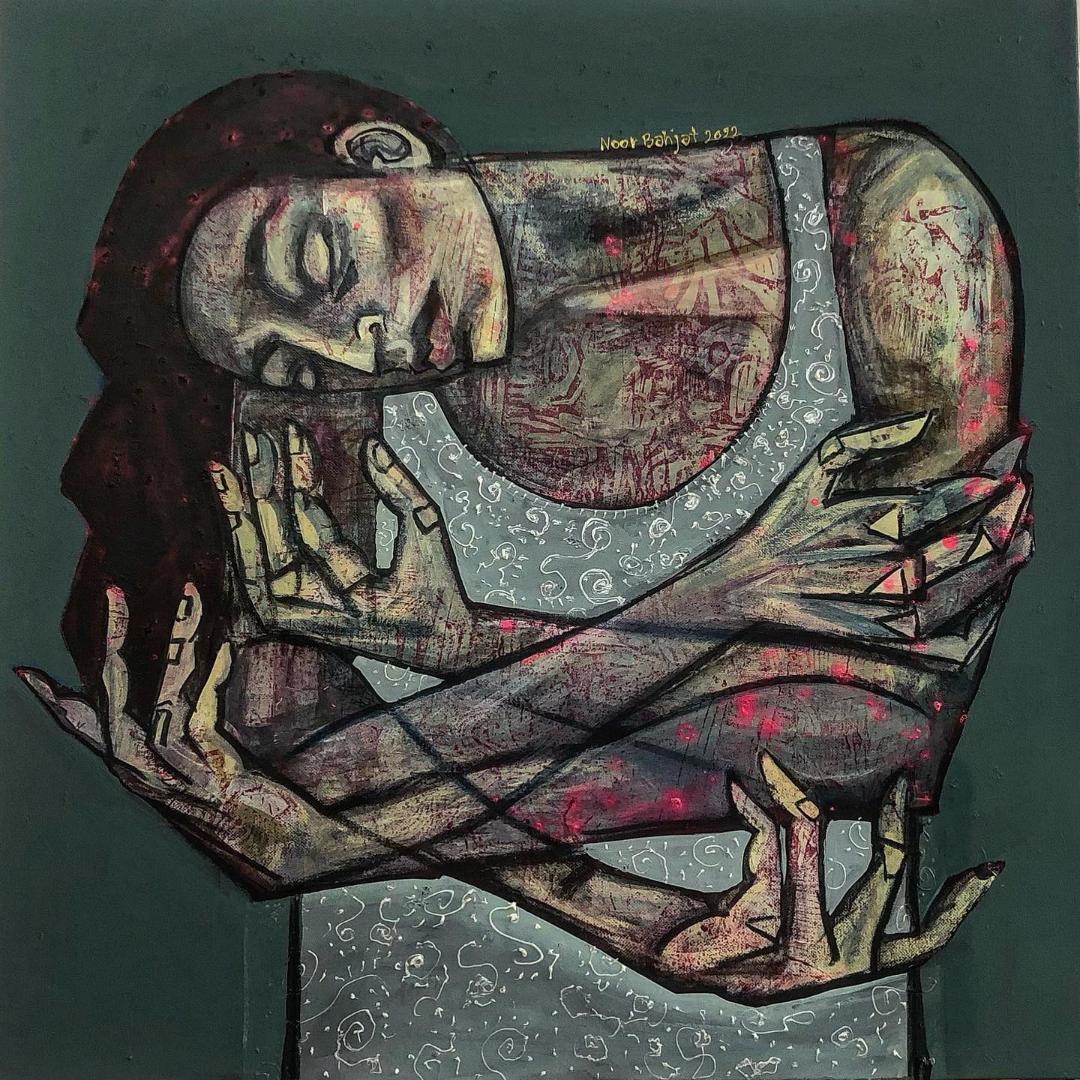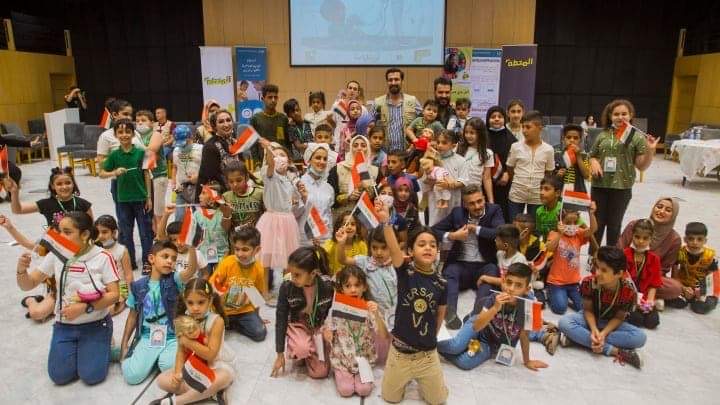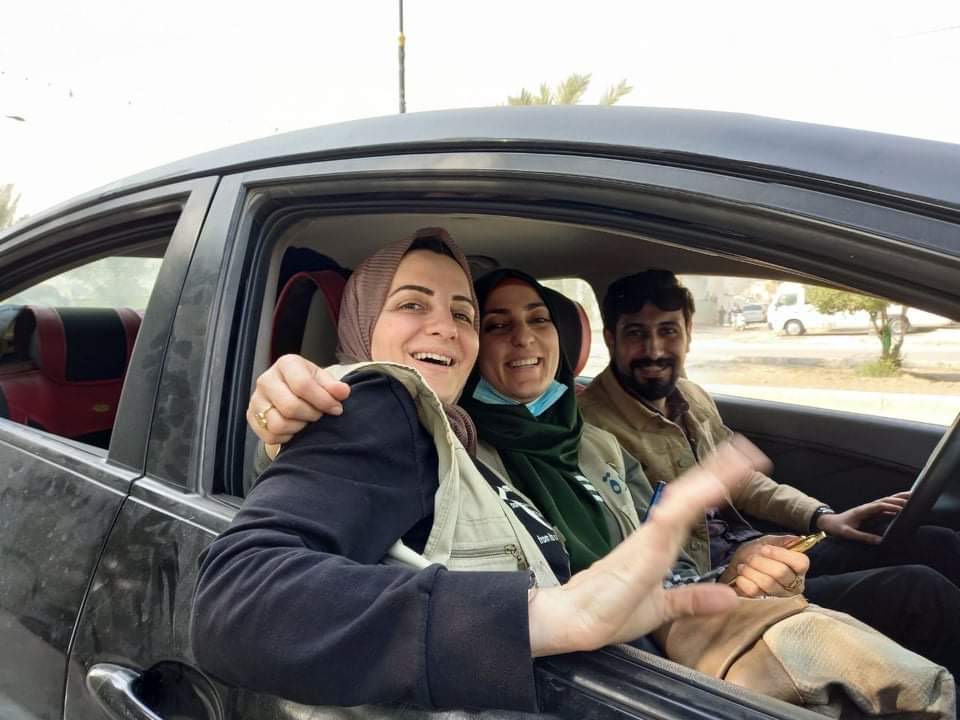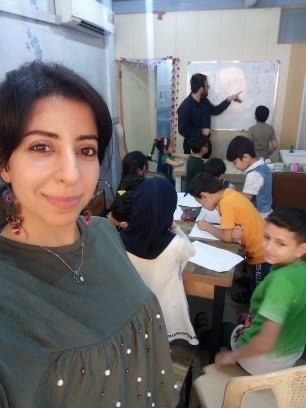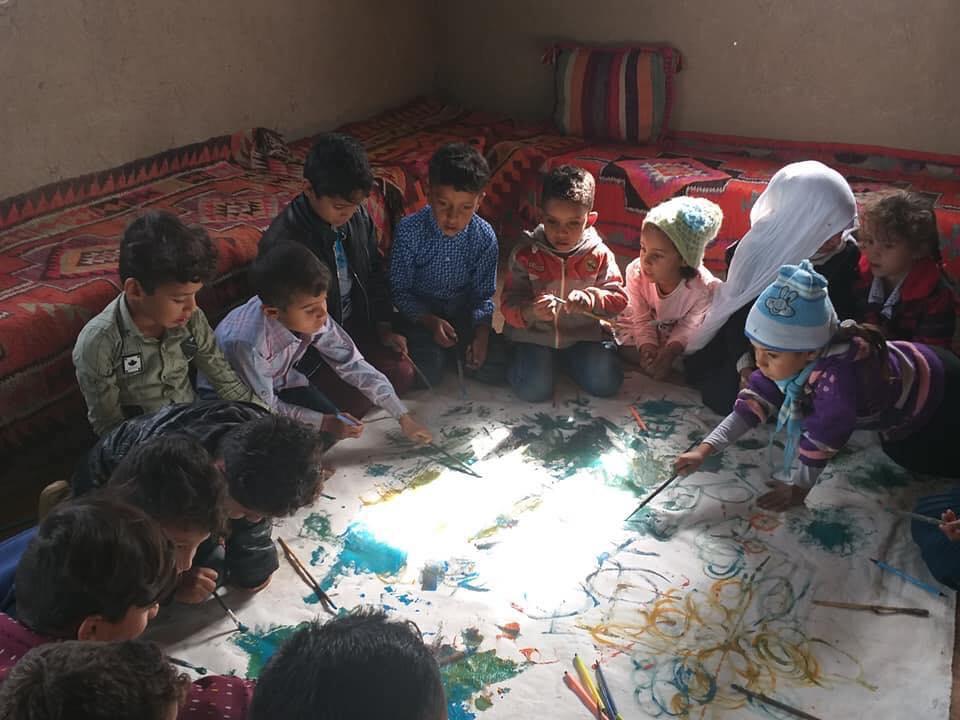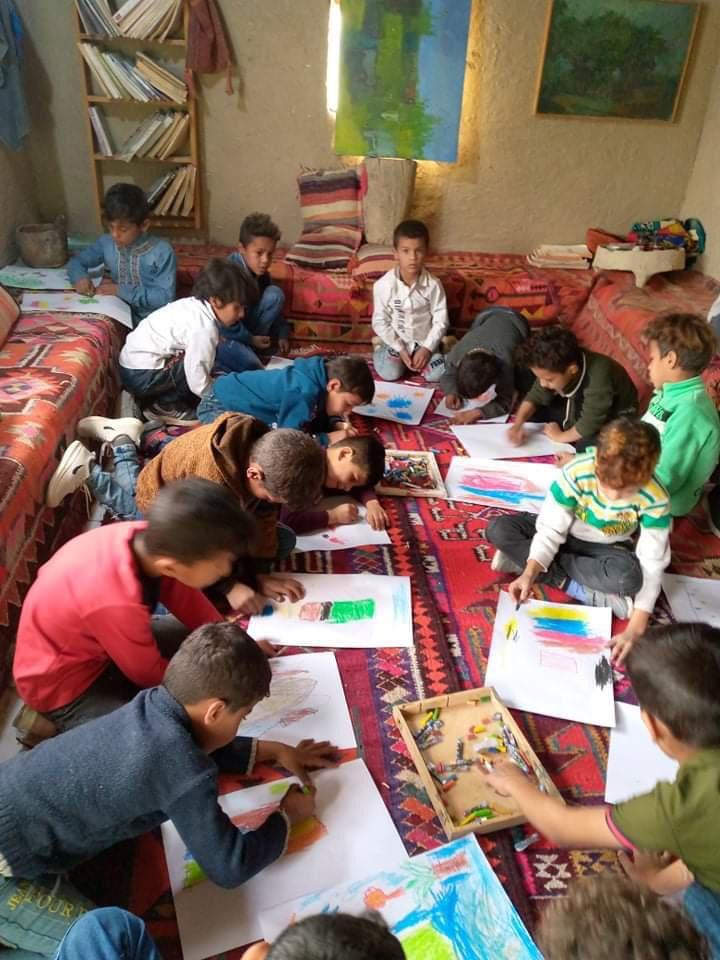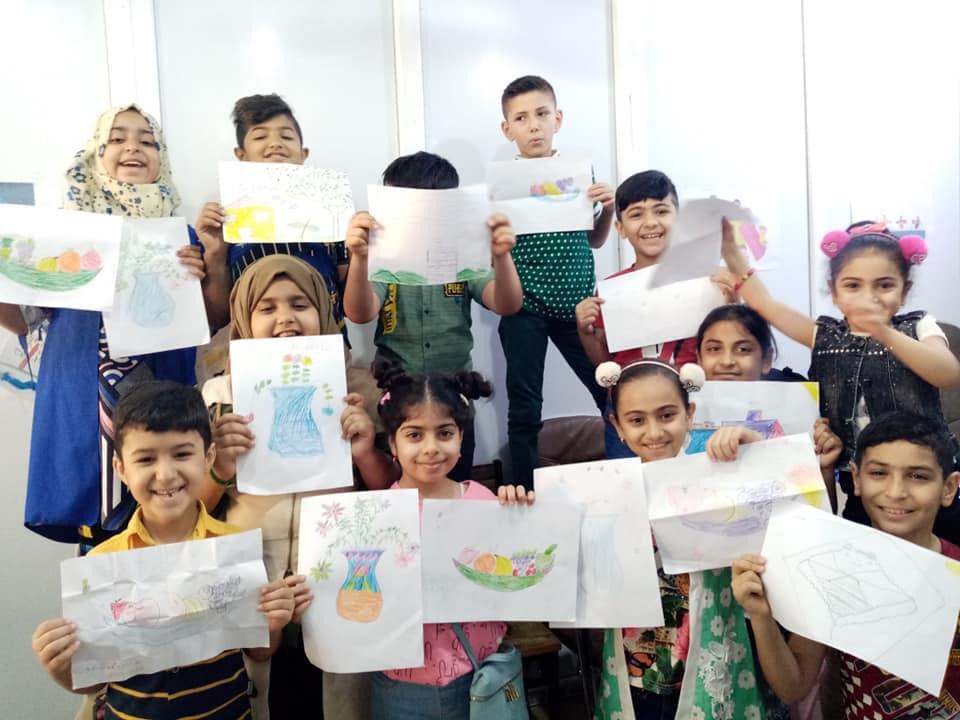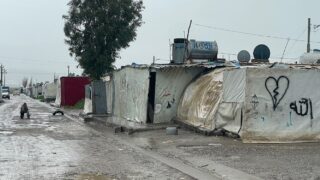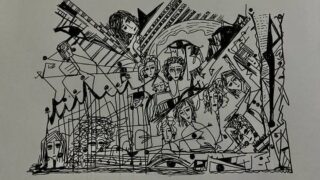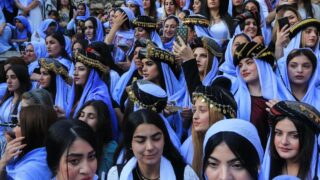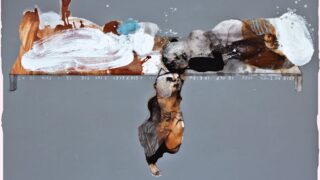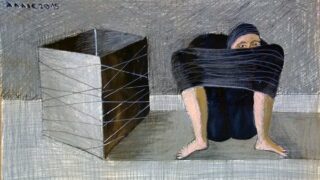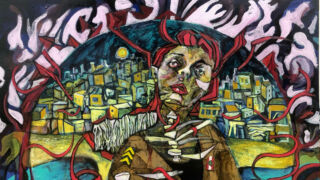
This publication has benefited from the support of the Rosa Luxemburg Foundation. This text may be reproduced in part or in full, provided the source is acknowledged.
Were we to walk these days by the banks of Tigris or Euphrates in Iraq, we’d definitely find a group of young women and men volunteers, wearing masks and gloves, collecting trash accumulated by the river banks in large bags. They call themselves the “ambassadors of cleanliness”, and they have taken it upon themselves to do what their local and regional municipalities have failed to provide.
Cleanliness in Iraq seems like an act of resistance against the overwhelming negligence and vandalism that Iraqis experience everywhere; in streets, official departments, public gardens, schools, and universities. Then, were we to hop onto any taxi, in Basra for instance (a city deprived of most services; neglected in a way that surpasses that of other Iraqi cities), or onto a boat to cross Shatt al- Arab River, we’d notice the perfect cleanliness of that car or boat, which completely contradicts with all the street waste, dirt, rocks, rubble piled up for years from buildings demolished but never cleared, and the remains of fishing boats and warships stacked by the banks of Shatt al-Arab. Thanks to negligence, this important water surface, the only shipping path into Iraq and a source of income for fishermen in Basra, has turned into a dumpster of garbage and rusted ships.
Cleaning personal spaces and other voluntary initiatives to remove waste from public spaces, however, isn’t the only popular act of resistance in the face of the failure of consecutive Iraqi governments, following the American occupation of Iraq in 2003, to provide a dignified life for Iraqis. There have been many initiatives that have surfaced to meet urgent social needs. Some such initiatives were met with threats by partisan and militia affiliated authorities, and were thus discontinued. One of these initiatives was that to independently replant trees in Iraqi cities, especially following the both arbitrary and organized operations to cut down trees and palm trees, while destroying many gardens, in order to establish shopping centres and tasteless buildings for their owner’s profits, pouring into the machine of corruption that has been gnawing at state institutions.
In the following, we’ll introduce some of these many initiatives. We’ve chosen a number of them which exemplify different backgrounds and experiences; some have garnered limited social interaction while others have expanded. Additionally, we have chosen to focus on women’s initiatives in specific because women in Iraq have suffered, and still do, an extended amount of social marginalisation. They have been left alone for decades, due to the successive wars and political crises. They thus became the sole financial supporters to their families, becoming the heads of family and the sole breadwinners after many men became absent, were killed, kidnapped, or had migrated from the country. And so, Iraqi women have become experts at managing complex symbiotic systems within extended families, neighbourhoods, villages, and cities, and, thus, society as a whole. During every crisis that Iraq has been through, one sees that women have created an interrelated social configuration to provide for their needs and help and empower each other. That’s what happened throughout the many wars that Iraq has been through over the past half century, and during the economic siege, which lasted for 13 years (1). This was also evident during the October 2019 uprising, where women managed a complete system in support of the demonstrations and rallies – providing protection, food, clothing, first aid, collecting donations, and producing publications specialised in covering news from the demonstrations. There were even women who came to the square with their protesting children, along with their washing machines. They would load them with protestors’ clothes, and enlist protesters to help them out!
1-Education and spreading environmental awareness
• Project Awda
Her timid smile couldn’t hide her powerful and radiating presence. She sat before me in one of Baghdad’s cafes to tell me her story. Marwa al-Naïmi had returned to Baghdad after a few years of living in Malaysia with her immediate family. Her husband wouldn’t let her finish her Master’s degree there, though she already holds a Bachelor’s degree in electronic engineering, and looks forward to work. Her conservative milieu wouldn’t allow her to take up work in the domain she studied; it would allow her to engage in a domain where only women worked. Marwa made do with the situation, acquiring new skills by conducting research, reading, and signing up for free courses online, where she learned about organic sprouting. She finally carried out a small project and applied with for the Startup Weekend competition in Baghdad. Her project ranked first out of 250 projects. “When they announced that my project won, I thought I was dreaming. I had always believed in my ability to accomplish something special, although I never even heard the word ‘congratulations’ from my then husband at the time”, Marwa says. She then signed up for the Active Citizen workshop at the British Institute in Baghdad, to experiment with launching small social service projects. During the course of the 4-month workshop, Marwa became friends with Wafaa Hamandi and Haidar Zamel. The trio would later cofound the Awda project.
The idea began with Ahmad, a teenage boy who used to work in cleaning one of the public schools, and had a great desire to continue his school studies. Ahmad shared his thoughts with the school principal and asked her to sign him up for school, but she refused, saying that he lacked necessary official documents. Marwa explains that most school drop-outs have been displaced from the areas that fell under the control and terror of ISIL, and that issuing official papers to these kids requires a lot of time and effort. This issue does not only affect Iraqi kids, but also Syrian refugee kids, who aren’t allowed to sign up to public schools in Iraq. This was one of the main reasons that the Awda project was launched and maintained after the Active Citizen workshop ended, without any official help, and with a purely personal effort.
The project is focused on carrying out lessons and educational activities for children for 4 hours a day by using games and interactive educational tools that keep boredom at bay while raising the kids’ interest in attending school and learning. At first, Wafaa offered a part of her house as a space to hold classes in. In coordination with the municipalities of some of the areas in Baghdad and the local community police, the project creators were able to obtain access to different locations in Baghdad to extend their reach and integrate a larger number of children who had dropped out of schools. They did so with the help of volunteers, while focusing on the less fortunate areas as well as the areas where displaced communities had settled. After 3 months of general classes, an attempt to register these kids at school would follow, that is, once their official papers had been issued, while also helping them obtain school books and supplies. They do so in partnership with the Fast Track schools, which is a program that helps reintegrate older children in classes better suited for their age group, following an evaluation exam.
• Project Friends of the Environment
The Awda project kids were the first to participate in the Friends of the Environment project, which was founded by the same activist group. The latter is an eco-awareness raising project for children, which has been implemented in two public schools so far. The project aims to teach children the importance of conserving nature and teaches them simple agricultural hacks that they could apply either at school or at home. “Kids enjoy playing with clay and earth, and we use that to teach them how to become friends with the environment and to protect it.” Marwa continues: “Each one of the team members has a certain skill and potential that they could offer; during the pandemic, Awda’s classes stopped, and so we began to work on distributing food aid to impoverished families in need, whose livelihood was impacted by the lockdown. Each of one of our team members had the motivation and desire to make a shift in the country’s miserable state. We try to ‘slip honey into poison’, seeing that life’s conditions in this country are exceedingly harsh and toxic.”
• Green Gold (GG)
Encouraged by her group, Marwa began to revisit her main passion, which is organic compost entirely produced of light material leftovers from restaurant and home meals. She thus started working on a project she called “Green Gold”, which ended up representing Iraq in the young entrepreneurs’ conference in Jordan in 2019. Marwa’s dream is to turn the project into a farm/for-profit institute for the empowerment of women farmworkers, to teach them how to make natural compost in their lands and use it for farming. Marwa hopes to contribute to a change in farming reality and the environmental practices that badly affect agriculture in Iraq, which are the result of lack of consciousness, resources, and scant official support. She also wishes to contribute – even if mildly – to helping farmers remain in their agricultural lands, rather than abandon those for the city, thus turning into unproductive consumers, and achieve food self-sufficiency.
• The Academy of the Determined in Basra
My friends have proposed a visit to Basra – which is the second biggest city in Iraq, deeply rooted in cultural, artistic, and political history. Ever since childhood, visiting Basra has been a dream of mine which was always put off due to a number of reasons, often connected to the political situation, be it the war which struck Basra badly, the tangible but invisible social and political divisions between the capital and the governorates under the former regime, or the religious parties’ control over the city since 2003.
However, the awareness raised through the 2018 protests and the 2019 October uprising has stirred up a great desire, especially among young people, to get to know the different Iraqi regions and open up to everything that this country holds, its wealth, and its abundant cultural diversity. All along the road to Basra, my friends spoke with excitement about the first graduation ceremony at the Fighters Academy. They described how many photographers, social activists, social media influencers, and some media channels flocked to Basra just to attend the graduation ceremony of the Academy of the “determined children”. The expression implies a rejection of the usual categorising of people born with a physical or mental nature that is different from the perceived norms. “Persons with special needs” or “people with disability” are no longer called those labels that focus on what they lack. Rather, this expression – the determined- focuses on the effort they make to face challenges, in societies that still treat them as “different”.
Tala Khalil, originally a pharmacist, had the idea in 2015 to start an academy to support a group of kids who were being treated in the specialised children’s hospital in Basra. She volunteered to collect all the children in a hall in the hospital and engage them in activities and events intended to alleviate the pain of their illness and the suffering that their treatment causes, which isolates them, sometimes causing them to drop out of school. Her idea then evolved into a children’s “School of the Determined”, for those with speech impediments or auditory impairments, children with autism, and those with special physical and mental needs. These children are often denied schooling, as they require a special kind of attention, and so end up either at home or at neglected care centres that provide them with neither education nor entertainment. They turn into “burdens” on their families, despite having the potential to be active members of society should they be provided with the full care they need.
Tala presented her project to the Ministry of Education, but her proposal was rejected. She then found another way, applying for funding from the Iraqi central bank, which donated a building space for 3 years, where Tala founded the Fighters Academy; the first free of charge academy in Iraq that focuses on “determined persons”. Since 2018, the academy has received hundreds of students and provides, with the help of a team of volunteers, special educational programs and talent development programs, including music, drawing, handcrafts, and language courses, along with psychological rehabilitation for 3 years, after which they become better able to integrate as active members of society.
Tala spoke at the graduation ceremony, which was held at the International Basra Stadium and was attended by three thousand people, about the challenges she faced in founding the academy. She mentioned a few children who were considered hopeless cases due to bullying, neglect, and severe health issues, but who now enjoy good health and are happy, thanks to the programs and support that the academy provided them. “Three years ago, the entire Iraqi state stood against me and accused me of insanity for trying to gather these children and help them. Today I’ve brought all of Iraq to come see what these children have done”. That’s how Tala concluded her speech in the ceremony, where students presented activities, artistic skills, music, songs, ballet dances, and performances, touching the hearts of attendees, some of whom could not help but shed tears of joy.
2- Reviving heritage
• The neighbour and her small sewing machine that changed lives
“I’ll start from the beginning”. That’s how Raghda al-Azzawi, the owner of the Lamasat Tailoring Institute in Baghdad began to tell me her story. Raghda got married when she was just a minor and suffered terrible experiences in her marriage. She told me how her neighbour insisted on teaching her how to sew and gifted her a first sewing machine. She would see in sewing a release and an outlet away from her difficult life. One day, Raghda found herself sitting outside her home, surrounded by all her personal belongings, after her husband kicked her out of the house while 9-months pregnant. Among those items was her sewing machine. Raghda says: “I sat there waiting for my parents to pick me up, while my mind clung to that machine. I felt it would be my saviour”. The young woman returned with her family to the Salman Beik area, which is around 24 km south of the capital – a small area, with a population of no more than 120 thousand people. She had her uncle help her convince her father to rent a small place in on same street as her parents’ place, where she would have an income from sewing for the first time in her life. Raghda’s ambition grew bigger though, and so she moved to Baghdad once more, and began building herself up from zero. She worked at a clothing store for a while, then was appointed as a sewing instructor in one of the well-known tailoring institutes in Baghdad. She forged her own path until she opened her small tailoring institute – from which 46 women have graduated so far, some of whom do it for a career these days. Raghda provides women with tailoring courses for cheap prices, because what she aims for, as she says, is to have them become financially independent later, just as her neighbour had previously done for her. Raghda also provides very cheap e-learning sewing courses for the women who are unable to attend the institute, for social reasons or other hurdles… These courses would then draw in women from all over Iraq’s governorates, as well as Arab countries. However, and ever since the pandemic broke out and the general economic situation worsened, she was forced to shut down the institute as she could no longer afford to pay rent. And yet, she maintained her sewing classes and moved them to her own house. She still hopes to reopen the institute, and dreams that it would also become a source of income for other instructors whom she could employ there.
• Humans without Borders
I met with Rifqa Khalil, my friend who not only held a PhD in philosophy, but who breathes and lives philosophy, in one of the cafes in historic Baghdad. When I told her I was looking for women-led initiatives for the communal benefit, she smiled and told me about her own team, Humans without Borders, a voluntary project founded in 2015 which operates in both Babylon and Nasiriya governorates mainly, and in the capital Baghdad, as well as in Fallujah and Mosul.
The team relies on young volunteers who have put together their ideas and efforts to help those less fortunate in their society. It also relies on the financial donations it receives, for which legal receipts are issued – to safely track them for both donors and beneficiaries. Through this initiative, the Rahma Housing Block was built in Nasiriya, made up of 10 small houses that were given to families without shelter, with leases for life. They have also opened up projects to teach sewing for more than 50 women in Nasiriya as well, while supporting small projects (like buying cars for a head of family in need, buying an SUV for another family, providing funds for a small sewing project, artisanal handcrafts, and so on), to help families, especially those who rely on single mothers, to empower them provide their daily bread, as well as collect donations to provide treatment for chronic diseases, buy school supplies, food aid for families, and blankets and clothes for refugee camps of the displaced who’d escaped ISIL in Falluja and Mosul.
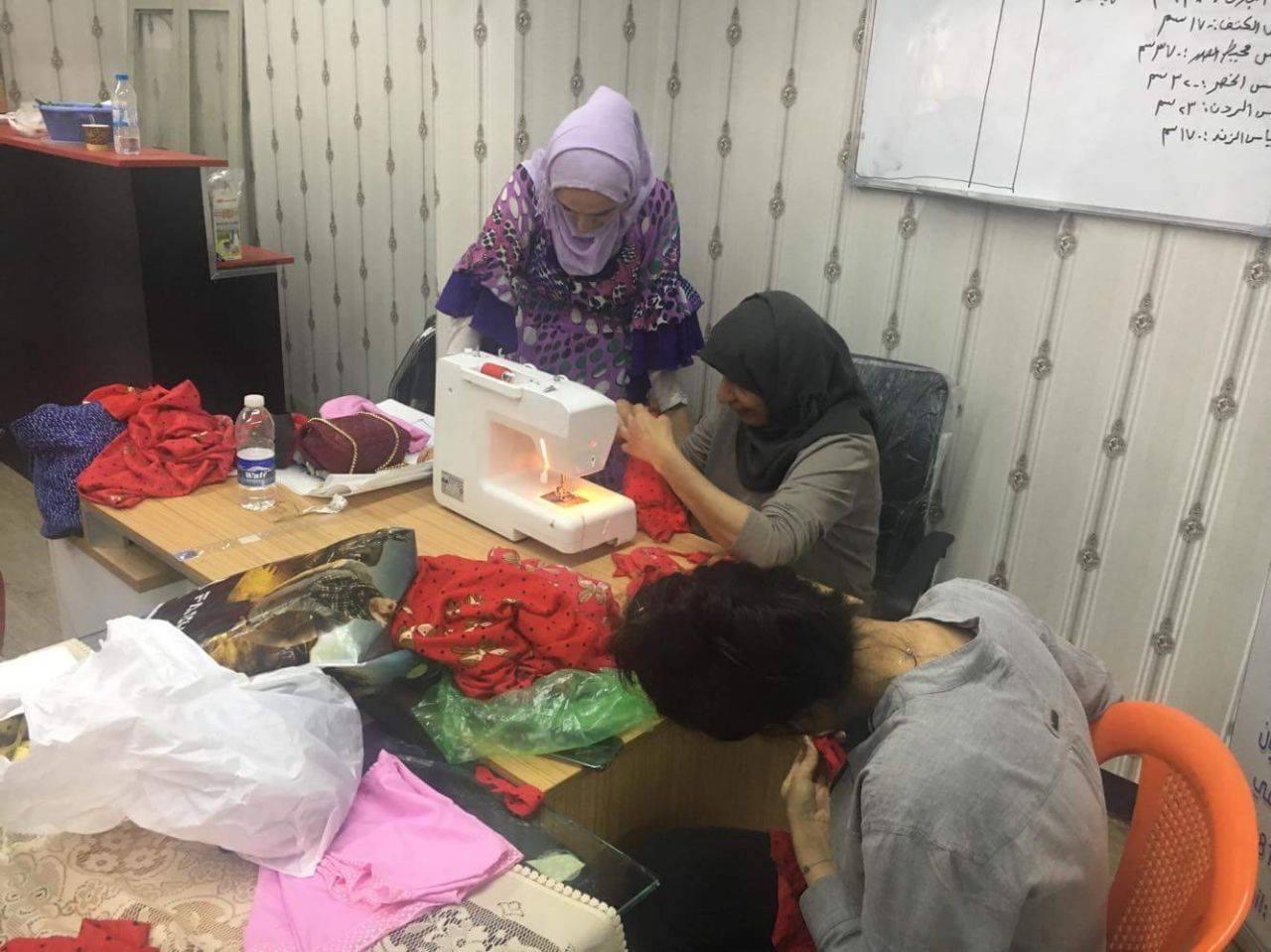
The team has established many educational and entertainment projects for the displaced kids in Babylon and Baghdad, like the mobile cinema project, the Cabin project, which is a safe space to teach kids arts and drawing in the less fortunate areas. These are just some of the activities carried out by the Humans without Borders team of volunteers in some Iraqi cities – whose populations have suffered much and still do, as they have been – and still are- neglected by the consecutive Iraqi governments.
• Made in Iraq
Nour Hashem, who holds a BA in political sciences, has a passion for Iraqi heritage and design, and so begins the for-profit Hili project in 2017. The project relies entirely on Iraqi raw materials as well artisanal Iraqi hands, mostly women (like carpet-making artisans in Samawa governorate south of Iraq) as well as designs inspired by the legacy and history of Iraq. In some of her products, Hili also sources materials that were organically and locally planted, like the herbs and plants used in the soap and candle making industry.
• Empowering women post ISIL
Um Imad, who had lost her children to the war of liberating Mosul from ISIL, decided to open a kitchen she called “A Taste of Mosul”, to prepare meals with Mosul-based recipes and deliver them to houses. The project is entirely run by women and aims to employ widows, who were left to provide for their families alone, in a city that tries to rise up from under the rubble of a terrorist occupation and a devastating war. The project began with two ladies, and after a few years only, became a source of income and empowerment to twenty working widows or divorcees. It made them self-sufficient, able to earn their own daily bread and that of their children.
***
The saying goes “Give a person a fish and you feed them for a day; teach a person to fish and you feed them for a lifetime.” Many empowerment projects and women’s communal initiatives from all over Iraq haven’t been mentioned here; that would require a book or an extended research on its own. The abovementioned, however, are merely a few initiatives and projects launched by women who had learned from their own experiences and the history of the country they live in – a craft that Iraqi women have passed on for decades and perfected – lifemaking amidst harshness and misery.
The content of this publication is the sole responsibility of Assafir Al-Arabi and Rosa Luxemburg Foundation cannot accept any liability for it.
Translated from Arabic by Yasmine Haj
Published in Assafir Al-Arabi on 19/04/2022
1- UN Resolution 661, which was issued on August 6th, 1990, following the Iraqi invasion of Kuwait, and which approved suffocating economic sanctions. Dozens of consecutive decisions that solidified it followed, and was maintained until 2003. The resolution unravelled in a humanitarian catastrophe and the death of a half a million child as a result of malnutrition, lack of medicine, and the collapse of all public services institutions.

